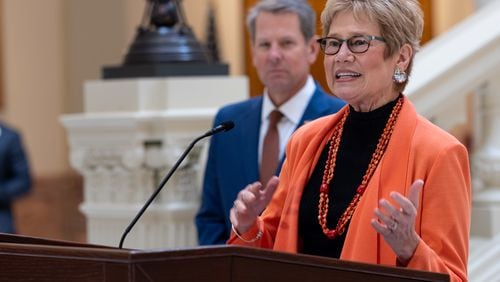Georgia’s public health commissioner told state legislators they had addressed a critical problem in the fight against the coronavirus: pay so low that state epidemiologists were leaving for jobs at places like school systems and even fast food chains.
But there was only one problem, Dr. Kathleen Toomey conceded. A proposed $5,000 across-the-board raise would amount to less than a third of what was needed to pay these key employees the market rate.
As the pandemic enters its third year, the proposed pay raises underscore what critics see as a fundamental flaw in Gov. Brian Kemp’s proposed budget for the Department of Public Health. The state continues to rely on temporary federal funding to pay for emergency needs related to the pandemic – but the governor is asking lawmakers for only a modest increase in permanent funding from the state.
That approach, critics say, will not prepare Georgia for the next public health emergency.
Overall, the proposed Department of Public Health budget appears to decline from $1.1 billion in spending for the fiscal year that ended in 2021 to $742 million for the fiscal year ending 2022. That includes both federal and state funding. The budget won’t be officially set until legislators take a final vote in the coming weeks.
To meet the need for pandemic resources, Kemp’s office points to more than $1 billion in federal pandemic stimulus aid spent over two years in Georgia. And “on top of all of this, there are several investments we made that have helped address negative impacts of the pandemic,” said Kemp spokeswoman Katie Byrd. Those included funding spent outside of DPH such as increases in the amount Medicaid pays doctors and increases in the number of poor new moms who can get Medicaid, she said.
Critics say that public health is under-funded at both the state and federal level — “for decades, and increasingly so,” said Tom Frieden, CEO of Resolve to Save Lives and former director of the Centers for Disease Control and Prevention.
While the portion of state funding in the budget is rising, the combined state and federal money that Kemp and Toomey are requesting for DPH in 2022 is lower than not only the past two years of the pandemic, but also lower than the $824 million it spent in 2019.
Toomey and her regional health department staffers declined through representatives to be interviewed for this article.
The permanent additions to the DPH budget that Kemp plans to fund with state money “reflect a critical need,” said Harry Heiman, a professor in Georgia State University’s School of Public Health. “But what we’re not seeing, that is also a critical need, is a strategic and sustained investment in public health.
“The fact that there’s not a significant outcry and a sustained outcry about our lack of investment in public health, both infrastructure and workforce, is kind of shocking to me,” he said.
The debate all plays out as Georgia’s rainy day savings fund has grown to more than $4 billion.
Toomey, who is appointed by the governor, seldom opposes Kemp in public. Speaking before a budget committee last week, she said she was excited about this year’s budget. Kemp, in his State of the State address laying out his funding priorities for the coming year, did not include the words “public health.”
Public health investments that would last, including hiring more permanent and well-paid workers at both local and headquarter levels, is what public health advocates such as Heiman say are needed.
DPH staff to administer COVID tests to the public has been strained at crucial times, including recently. So has staff to visit nursing homes to administer booster shots and manage the cumbersome deep-freeze logistics of transporting the vaccines, or extra workers to simply come help out. The state has said it is working closely with the facilities and testing providers to connect residents to boosters if they want them.
“I think we all may at times feel somewhat handcuffed by limitations of financial resources,” said Tony Marshall, who represents nursing homes as the CEO of Georgia Healthcare Association. In previous surges, there were federal resources to send staff to nursing homes. “With omicron, our need is probably greater than it was at any point previously, but that program was not put back into place for nursing centers.”
Kemp’s budget request would add extra state money for some specific healthcare services. It would add $9.9 million in state funds necessary to match federal funds to keep an HIV grant program alive. It would give $4.4 million to fund a statewide routing center for Georgia hospitals lacking adequate tools or staff to transfer their patients elsewhere. The proposed budget would continue to fund work to replace an aging vaccination registry system and develop a computerized disease surveillance system “of the Future.”
Relying on temporary federal funds has left the state struggling to meet surging public health needs.
“The fact that there's not a significant outcry and a sustained outcry about our lack of investment in public health, both infrastructure and workforce, is kind of shocking to me."
Staff shortages due to sickness is part of what hampered COVID testing during this winter’s omicron surge, Toomey told lawmakers. As metro Atlantans prepared for holiday travel, hours-long lines appeared at testing sites unprepared to handle the demand. Many people gave up and drove away without getting tested.
“What we didn’t anticipate was not only how quickly it would spread, but the fact that so many of our staff and our contract staff would themselves become infected,” Toomey said.
The critics who paint Georgia’s public health funding plans as piecemeal and thin point to the functions that public health resources perform. Much like a war, it requires both tactical equipment and soldiers and officers on the ground, and already up to speed.
Rep. Rebecca Mitchell, D-Snellville, a trained epidemiologist, pointed to the constant function of public health in vaccinating kids and adults against various diseases, and the secondary effect that has in building relationships between vaccination workers and the community.
“Who does that outreach and sustains community trust in vaccinations? Public health,” Mitchell said. “People look and say, why are we doing this outreach? (Well,) we’re doing this outreach to prevent the situation we’re in right now.”
Rep. Butch Parrish, R-Swainsboro, chairs the House Appropriations Committee’s subcommittee on health and oversees consideration of the DPH budget. Parrish called Kemp’s increases for employee pay and in the HIV program “a giant step forward.”
Parrish conceded that the $5,000 increase still leaves Georgia public health workers well below market average, but added, “I think you got to start somewhere.”
There may be a $4 billion surplus in the state, Parrish said, but “You can go to any agency you want to talk to and everybody is going to make a good solid case” that it needs the money. “And that’s right. And we just we cannot do everything.”
About the Author








